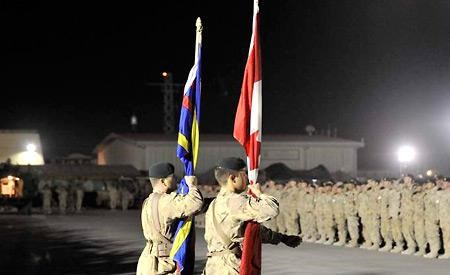by Tod Strickland Up until about 1300 hours today, I had thought I was going to be writing about how soldiers relax and kill time while they are on tour. I had envisioned something a little light in tone, describing the coffee shops that we have to choose from, our excellent gym facilities or the Kandahar Ball Hockey League. But one thing you never get used to about being on tour, is that plans change and you very rarely have control over how your day is going to unfold. Today we had a soldier killed in action.
I did not know the young corporal from Quebec, whose life ended in a moment while I was finishing my workout and taking a break from the office. I know that he was well thought of, and was killed while doing a difficult (if not thankless) job as an infantryman on patrol in one of the rougher districts of Kandahar Province. My understanding is that he was the lead man on the patrol, a job that you do not entrust to anyone but the most competent of individuals. “Walking point” is only entrusted to those who have their wits about them and can watch for the indicators that show when you are about to have a bad day. They have to be professionals, ready and able to react on a split-second’s notice and even when they do everything right, everything their training and experience has taught them, soldiers can, and do, still die.
Back here at the airfield we have the luxury of distance, between us and the dead—something his friends will not have. Proximity to the individual who was killed makes handling everything that much harder. The distance helps when you are working at headquarters and trying to sort through the myriad details that have to be arranged. Everyone has their role.
As sad as a death is, there is still a direct job to be done on the battlefield. Our operations centre staff make sure the area where the incident happened stays secure, and work to ensure one death does not lead to more. The area is contained; local civilians are reassured that we are in control of the situation; investigations occur; the mission has to be accomplished. We cannot let the death of one man result in mission failure or it negates our entire purpose in being here.
Provisions are supplied to the troops on the ground to ensure they have what they need to do the job. It might be helicopters to bring in our Counter-Improvised Explosive Device (CIED) folks or military police to carry out their investigations, or combat supplies. It could be reallocating unmanned aerial vehicles so that there is always an “eye in the sky,” offering protection in case something else happens. There will be a casualty evacuation (CASEVAC) mission to bring the soldier’s body back to our base at Kandahar Air Field.
As bad as our day might be here in Afghanistan, there is a family back in Canada that is about to have the worst day of their lives. I think that pretty much everyone here realizes it could be our families going through this circumstance, and it naturally leads to everyone digging a little deeper and trying to make things as easy as possible.
Our personnel officer is among the busiest. It falls to him and his staff to cut through the red tape of military bureaucracy and apply common sense to, what is at its heart, an emotionally complex situation. They need to confirm the identity of the soldier who was killed, ensure we know where the individual’s next of kin are located, that the soldier’s equipment and personal effects are collected up and that notification teams back in Canada are given as much information as possible to assist them with their unenviable task. Everything has to be done perfectly, with no complications or errors, under the pressure of time and incomplete information, while answering to numerous different offices and agencies both here and back home.
The camp sergeant-major orchestrates a ramp ceremony and looks after every little detail, the padre puts together a service of remembrance, a bearer party (frequently made up of the soldier’s friends) who must rehearse their drills knowing that their emotions could be carried on the nightly news. This task is made all the more difficult by the desire to do it as correctly as possible, to honour the troop you are carrying.
Our roles end when the aircraft carrying the remains of our casualty leaves the ground, and the ramp ceremony is dismissed. All too quickly, we move back to focussing on the mission and our “routine” tasks. To an outsider it might appear that the death of one of our own is quickly forgotten as activities turn back to the mission, and the tempo returns to what passes for normal here. To think that would be wrong; it is never easier to accept and all you can do is the best that you can, hiding your grief in the everyday tasks that must be done.
Lieutenant-Colonel Tod Strickland is Assistant Chief of Staff for Task Force 5-10, and member of the Princess Patricia Canadian Light Infantry, serving in Kandahar, Afghanistan.



